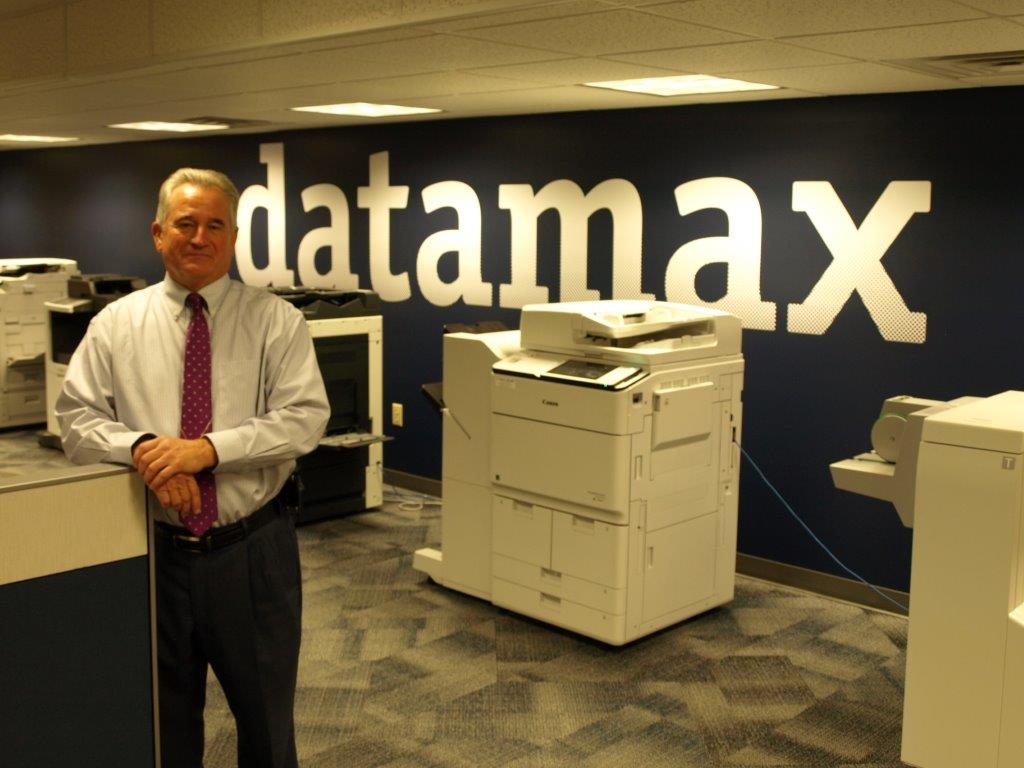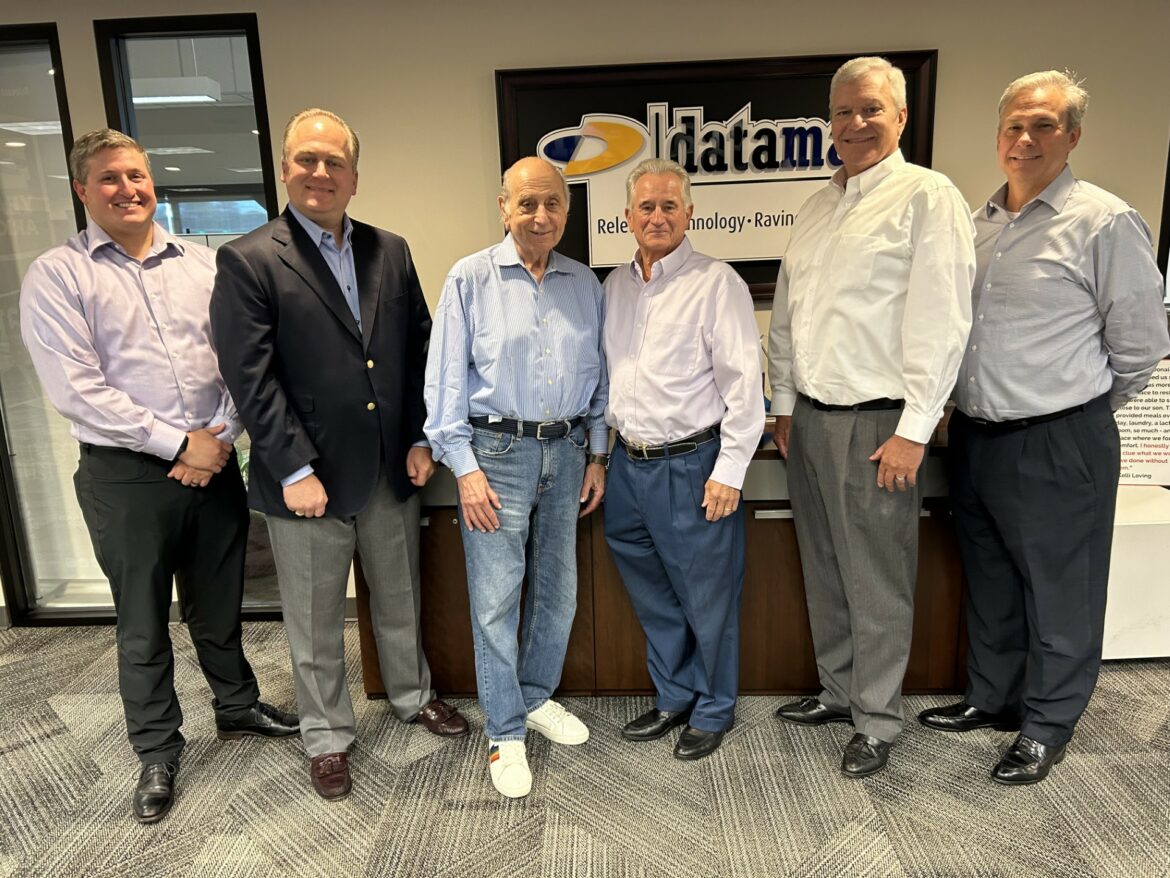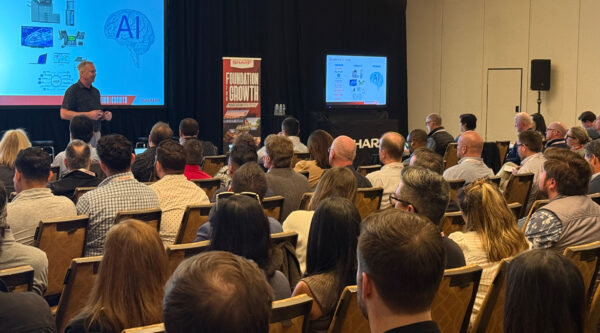Above, left to right: Cody Simon, Steven Sumner, Frank G. Cannata, Barry Simon, David Holzhauer, and David Rhodes.
Carol and I made a long-postponed visit to Little Rock, Arkansas. Our host dealer was none other than Barry Simon of Datamax.

Barry Simon
What made this visit more special were the people from other Datamax locations that Barry summoned to join us in Little Rock. We had the pleasure of meeting with David Rhodes, division president from Copell, Texas; David Holzhauer, division president in Little Rock; and Steven Sumner, chief operating officer in St. Louis, Missouri.
It was extremely kind of Barry to bring two senior members of his team from Missouri and Texas. For those of us who know Barry, that is no surprise. It certainly made for a remarkably interesting discussion.
Barry and his three executives responded to the questions. Rather than attributing the responses to any one individual we are using B&T to denote Barry and his team.
Frank: How is your business compared to the pre-pandemic period? What do you believe you have experienced that yielded this result during an exceedingly tough time?
B+T: We held our own for several reasons. We inserted minimum service costs in all our contracts and that was huge. We also had many clients extend their existing leases with all the previous protections—price, service, etc. We must thank the Governor of Arkansas, who did an excellent job curbing the spread of COVID-19. Like everyone else, we could not get products, which was exceedingly difficult to deal with. The result was we had a very positive 2023 filling all those backorders.
There was more and we would have to say our leasing flexibility through our own leasing division. Business in Arkansas tends to be more rural. We shut down for six weeks. What slowed down more than anything else was a slowdown in the expansion of our business.
In Texas, we experienced increased volumes, particularly in rural East Texas, where there is no internet. We did not lay off any of our techs—others did and paid the price when [people] went back to work. Our competitors were having a tough time rehiring people who either left the industry or found work at another company.
Frank: Given the difficulties that were created by fewer employees working full time in their respective offices, what are some of the things you have done to compensate for that?
B+T: We did several things that allowed us to maintain the business. We sold upgrades, including creating smaller service contracts. On the downside, we provided fewer machines at lower speeds, which resulted in lower revenue. In a major market like Dallas, upgrades were far from easy to get. The A4 machines, which sold at half the price compared to A3, had to manage higher volumes. Another problem caused by a lack of inventory was paying sales reps in advance until we had inventory.
Frank: On the soft side of the business, such as IT services, did you realize any new opportunities that enriched revenue?
B+T: Cybersecurity became an especially important service. We were fortunate that we had built a foundation of VoIP, managing networks that were very welcoming to our customers, providing them with solutions for this critical area. At the same time, VoIP was a wide-open area where you could easily sell to just about anybody with from 20-150 employees. We focused on getting our customers into programs with deeper and wider services. Security is really the most important thing. It is no longer optional, it is essential. We even encourage our clients to get insurance policies to minimize the damage if they are hacked.
Frank: What do you believe manufacturers should do to help their distribution recover from the pandemic’s damages?
B+T: We hoped they learned that they had to be honest about what the situation was such as lack of inventory. It caused a great loss of confidence and we had to pin them down. Distribution requires more than just trust. They should be interested in helping us with consolidation and stopping the deterioration of service. They are not serving us as well as they used to. It is apparent that they, as a group, reduced the number of service techs supporting their distribution. A lack of freight equalization is a big problem for distribution. A manufacturer chooses to use other ports for one reason or another, and as a result, freight prices can increase dramatically.
Frank: What have been the bright spots of the business in terms of revenue and profitability?
B+T: The bright spot, as we see it, is the products. They work very well, which has reduced the cost of technical services. The availability of competitive toner and parts has also been an immense help. We find third-party sources work very well. Adding to that, the production print aftermarket has been a real plus. That is one area where print is growing and provides good margins.
Frank: A large part of the discussion today was about diversification. What steps, if any, have you taken to accomplish this desirable goal?
B+T: We have struggled with it. Our approach is more about software such as PaperCut, Uniflow, document imaging, and increased efforts to get better cooperation between IT services and our sales team. We need to do a better job. One of our approaches is doing lunch and learns to increase the knowledge level of both teams. Our business was founded on basic principles—residual revenue being one of the most important. From what we have seen, suggestions about diversification do not provide that. There is no service or any aftermarket.
Frank: You’ve been in business since 1984, how do you feel about the future?
B+T: One thing we are confident about is that if anything needs services we will excel. If we get into something new or different we will stay with it. We have excellent plans for expansion and extension of existing products and services. We view our competition as weak. As a result, we feel confident about the future and do not focus on the decline of print. There are areas where it grows.
Frank: How would you assess your ability to cope with the rapid transition to a highly sophisticated environment from a technology standpoint?
B+T: Given that we have experience and have approached business in a conservative and very stable manner, we are fully capable of dealing with the transition of technology. We are confident because we welcome the opportunities to reinvest. You mentioned AI. It opens up a whole new opportunity, and it allows us to feel good about the future.
We want to thank Barry and his team for being wonderful hosts and look forward to seeing them again at the CDA meeting this October in Las Vegas.




